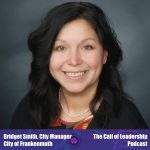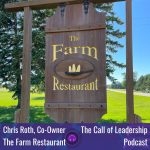Like many cities, Frankenmuth weathered the Covid-19 storm. Virtually overnight, Frankenmuth went from a tourist destination to a ghost town. Now the town is open and Mayor Ackerman has empowered people to lead to help this vibrant community reopen its doors.
Show Notes:
City of Frankenmuth Facebook Page (Click here)
Mayor Ackerman’s Facebook Page (Click here)
Sponsors:
Frankenmuth Convention and Visitor’s Bureau
Frankenmuth is one of the top tourist and family destinations in the state of Michigan. Known throughout the world, this exciting city is known for creating wonderful memories for generations of people from all walks of life. From retail shops, indoor dining to outdoor dining and outdoor sporting activities, there’s something for everyone at Michigan’s Little Bavarian. Start planning your next trip at Frankenmuth.org.
Transcript:
Cliff Duvernois: Ladies and gentlemen, welcome to the Call of Leadership podcast, where we interview people from our Michigan community who answered the call of leadership. We’ll hear the powerful stories and get their advice so that we can be better leaders for ourselves, our family, and our community. I am your host Cliff DuVernois, and today’s guest has a very long and distinguished career in the field of education where she retired from.
But she’s also served on the Frankenmuth rotary club as one of only two women presidents. She also serves on the special kids in action organization. Ladies and gentlemen, please. Welcome to the show. The Mayor of the city of Frankenmuth Mayor Mary Anne Ackerman. Mayor Ackerman. How are you?
Mary Anne Ackerman: I’m great Cliff. It’s a pleasure to be visiting with you this morning, and I hope that you are well, during this, COVID-19 crisis. And I look forward to chatting with you.
Cliff Duvernois: I’m really looking forward to this. I was very happy, when, when we established contact and you said, you’d agree to be on the podcast. Cause I know there’s, there’s a lot of people out there that, that would definitely like to learn more about what it is and what, what Frankenmuth is doing. So thank you for taking the time for us today.
I really do appreciate it.
Mary Anne Ackerman: My pleasure.
Cliff Duvernois: So tell us a little bit about where you’re from, where you grew up.
Mary Anne Ackerman: Well, I grew up in a little farm community called Reese, Michigan. I am one of six children, the oldest of six, my parents were farmers. And then later on, they transitioned to recreational vehicle sales. So they had us. A small snowmobile camper, boating business in the backyard, out on, on the farm. So it was through them that I learned all about work because that business was right in our backyard and we were always open, as, as children, we all attended Saint Elizabeth, Catholic school, through grade eight. And then following that. we, transitioned to Reese high school where we finished our school, career and, and church, was a big part of our upbringing.
Reese was a pretty great community to, to grow up in.
Cliff Duvernois: You mentioned something before about farming and they actually started a business afterwards. So it’s probably safe to say that you were probably pretty involved with helping out with the family business growing up.
Mary Anne Ackerman: Yes, absolutely. I remember as a young child being involved in the farming industry, we were responsible for. weeding the beans and the sugar beets. And we were responsible for providing meals for those that were working on the farm. And then later on, as my mom and dad, began to open their, recreational vehicle business, I would be responsible for helping.
In the house and with all the kids. And, I would do some running for them. For example, the campers and boats came from Goshen, Indiana. And so when I turned 16, one of my jobs would be to drive to Goshen, Indiana and, and pick up and bring home, boats and campers. And so I was actively involved the whole time.
Cliff Duvernois: When you graduated from high school, where did you go to college?
Mary Anne Ackerman: I’m part of the Delta difference. I chose to go to Delta college because I knew that I was responsible for paying for my own education. And Delta was very affordable, not only a great education, but, I could work and pay for my own. education and, following my two years at Delta, I had been able to accumulate enough money, enough savings that I was able to also then pay for my education, at Michigan state university.
Cliff Duvernois: You decided to pursue education as a major. Why is that?
Mary Anne Ackerman: That’s a, that’s an interesting question. I appreciate you asking that. One of my jobs was to work in the Reese summer migrant program. And at that time, many of the farmers in the surrounding area would hire migrant workers to come in and care for the crops during the summer.
And so there was a federal program that would allow for the children to come to the school and they would of course receive meals, but also education. Unfortunately as the migrant children would travel from location to location, following the different, pickings of the crops, they would be taken out of school a lot. So they tended to be behind in their. And their studies. And so we offered a full day program.
We would open at seven o’clock in the morning and close at five o’clock in the afternoon. We would provide them with three meals a day. And, we would, continually be working on brushing up their skills, their academic skills. We would go on field trips, a lot of fun events as well. And I worked in the summer migrant program for many years.
Primarily in the preschool program. And then later on, as I earned my degree in education, I served as the director of that preschool program. So it was a great, introduction to not only, The teaching field, but the importance of making sure that we care for all of our children, especially those who may not be as fortunate as, as others.
Cliff Duvernois: You decided to go even further with getting a degree in education. Cause you, you got your bachelor’s, but then you turned around and you went after your master’s in school administration. Why did you decide to pursue that?
Mary Anne Ackerman: So one of the things that I’ve found once I had earned my, my teaching degree, was teaching jobs were few and far between. The economy struggled and teachers were being laid off. And I knew that. If I were to earn a degree in, let’s say a master’s degree in reading or mathematics, the likely hood of finding a job, would even be more difficult because oftentimes with a master’s degree, for example, your salary would be a little bit higher.
So I decided that I needed to, pursue a different opportunity and have that kind of as backup plan in the event that I wasn’t able to find a teaching job, or perhaps if I were to have a teaching job and be laid off, I might be able to pursue a different avenue in education. And fortunately for me, it worked out.
Cliff Duvernois: That is certainly did. And you started off your teaching career in Millington, is that correct?
Mary Anne Ackerman: I sure did. I knew very little about Millington. I knew that, Millington had a good football team. Reese, would play Millington occasionally for football and basketball. And that was about all I knew about Millington. But as I mentioned, it was very difficult to find teaching jobs.
The Millington school system offered me a job as a substitute teacher. About six or seven weeks into my first substitute teaching assignment. There was a position that opened up in fifth grade and they offered it to me and, and I spent another 10, 11 years then at Millington teaching. Every grade from pre first grade all the way through sixth grade, it was a wonderful experience.
And in my final year at Millington, I served as the principal at Glaza Elementary School.
Cliff Duvernois: Your career spans from being a teacher to serving as a principal and then finally as superintendent. Was it always your goal to be a superintendent of a school district?
Mary Anne Ackerman: No, no heavens no heavens no. So following my time in Millington, I came to Frankenmuth, as the principal at List Elementary school, and I worked with a wonderful mentor. Mike Murphy, he was the superintendent of the Frankenmuth school district. Annually. We would sit down for our. Evaluation talk and following the evaluation, he would always turn the papers over and then he would say so.
So what are your plans for the future? And, and I would say my I’m not really sure. And, and then he would follow with, have you considered superintendency? And initially when he first asked that question, I was, I was surprised because I certainly didn’t see myself as being superintendent, material. But he continued to work with me and mentor me and, and then down the road, I, I was offered the position as superintendent.
So I was really grateful for that encouragement, that the encouragement in knowing that he saw the leadership potential in me and, and was willing to give me that opportunity.
Cliff Duvernois: I’ve I’ve had several guests on the podcast who have talked about how somebody has seen something in them that they didn’t see themselves. I’d like to go back and talk a little bit further about something that you’ve mentioned, where you said to yourself that you didn’t think that you had the material to be a superintendent.
Why is that? Why did you think that way?
Mary Anne Ackerman: Perhaps, initially it was because I was a female and as I watched those individuals who were leading our schools, primarily they, they were men. I don’t, I don’t think I had the confidence in myself.
I think that’s one thing that I’ve learned in my role now as mentoring future leaders is we as leaders, when we see other individuals who have that potential, it is our obligation to point that out to those people and say, Hey, have you ever thought about leadership? I think you’ve got this and this and this set of skills. And I think that, you would be a great leader. And so I really have enjoyed, my role. And I’ll talk about that later, as being one who can help, Fuel at that little spark and, and grow leaders.
And I think, especially in the world of education, great teachers need to be in the position of being in a position of leadership. They, they know what’s happening in the classrooms. They’ve lived it. And I believe that when you’ve had an opportunity to live the experience, it helps you in your leadership experience.
Cliff Duvernois: So speaking of leadership, and I do want to kind of circle back to that in a little bit, but in the meantime, you and your family moved, Frankenmuth in 1989. Why did you pick Frankenmuth?
Mary Anne Ackerman: Yeah, we did. So, when I also, when I turned 16, in addition to driving to Goshen to pick up boats and campers, I held my first, waitress job at the Franken house. And the Franken house was a new restaurant that was, built in Frankenmuth or actually it was in a building that was renovated. And at 16, I came over and filled out an application and got that job.
And I loved my experiencing where experience of waiting table and Frankenmuth. I loved the friendliness of the people. I love that a guy named Wally Bronner would come into the restaurant and he would bring some of his clients in for coffee. And he would introduce me by name to his clients. And that was such a lesson to me that it doesn’t matter who we are, how we treat others is just such an important thing. And so everything I learned about my experience there while I was waiting table here in Frankenmuth was a good thing. I also learned that the school system was really good and I wasn’t sure what it was about the school system.
But everybody talked about it as a, a great school system. And, and when people are saying good things, typically there are good things that are happening. So my husband and I, when we had our, our first child, Zachary, we knew that, Frankenmuth was where we wanted our children to go to school.
And so we purchased some property . When Zachary was six weeks old, we moved to Frankenmuth because we wanted to make sure that we were here in plenty of time for him to go to school. And so we’ve been here ever since. And, two or three years, after we moved here, I accepted the position as principal at List Elementary school. And I truly was all in to the community of Frankenmuth.
Cliff Duvernois: And you stayed very much active in education up until retirement. And even after retirement, it seems like you’ve been very active in this. Talk to us a little bit about what the, Executive in Residence Program is at SVSU.
Mary Anne Ackerman: Right. That’s kind of a fancy title. and, and what it means is I have had experience in the field and I now am on campus, working with individuals who are interested in a career in school administration. It’s a wonderful program. That has been endowed by the Gerstacker foundation and annually, my colleague, John Kaczynski, and I, we are part of, putting together a cohort of 12 individuals from all over the state.
And we come together a weekend, a month to study school leadership, and then we travel internationally to take a look at school systems in other countries. And of course the culture of that country. So we have traveled to Chung Ching, China, we’ve been to, Tokushima Japan. We’ve been to Hyvinkää Finland.
And most recently we were in Gunzenhausen, Ansbach and Neuendettelsau Germany to study education. So it’s a wonderful experience for the individuals that are involved. They develop a close network of colleagues that they can then, connect with and count on moving forward. And then we start over with a new group of, of, we call them Gerstacker fellows.
Cliff Duvernois: Wow, that sounds like an extensive program.
Mary Anne Ackerman: It. Yeah, it’s, it’s, it’s a wonderful, wonderful, program. And, and certainly one that I wish would have been available when, when I was first starting.
Cliff Duvernois: You’ve been involved with this program. You’re still active in the community. And at some point in time, you decided to throw your hat in the ring and run for mayor. Why is that?
Mary Anne Ackerman: Well, that was similar to my experience with, with former superintendent, Mike Murphy. I. there were several community members who knew that my role as a superintendent was done, I had moved on. And then the question is, “Have you ever considered city council?” Well, no I hadn’t, but, I certainly enjoy being active in our community and think that giving back to the community, that’s been so good for myself and my family is something that, that I needed to do. I, I ran for city council unopposed and, was elected and, really enjoyed my time on the, on the city council.
Cliff Duvernois: When you, when you ran for mayor and you and you made it into office, how do you think that your experience in education has prepared you to be mayor of Frankenmuth?
Mary Anne Ackerman: Oh, gosh, it has prepared me well, and I think not only my experience in education, but just my experience in community. So, so if I talk about community first, I had served with the Frankenmuth historical historical museum and foundation, for, for many, many years.
During that time, I. I met and got to know many residents, older residents, older citizens, and learned how they were all connected to each other. So that was one branch. Rotary was another branch, special kids in action, another branch. And then on top of that, all of the families. at Epic and with schools.
So 20 years of, of families, young and old, and the relationships that I had with those people really helped me. then in my role as city council, and that is mayor, to, to communicate with them and then help move the city forward.
Cliff Duvernois: What do you, what would you say is your greatest challenge as mayor?
Mary Anne Ackerman: Well, I’ve only been in the mayor business for a year and a half or so. And so I think that my. My, one of my bigger challenges has been just figuring it out. You know, what does, what does the mayor do? What are all of the different commissions and committees and authorities and what are their roles? How, how do I, how do we as a city best communicate with people?
You know, back in the day, the only way to communicate was of course, word of mouth and the, and the Frankenmuth news, which came out weekly. but today communication looks so different and it’s important to be on top of communication because. If we, or we as a city or I, as, as a mayor, do not get information out immediately.
Social media has that information out and it’s important to get factual information out right away. So I would say the communication piece, figuring that all out has been difficult. The COVID-19 crisis has been. Has been difficult. However, I have to say that there’s such a huge silver lining in what I, what we as a city have learned along the way about our tenacity and about our, our will and way of working together to get things done . While it’s been difficult and very challenging in the end, we certainly will have learned from it. And I think it will be very valuable as we move forward as a city. Cliff Duvernois: I absolutely agree on that account and it, with the COVID-19 the Corona recession, that’s happening. Why don’t you tell us what, what is your vision for the city of Frankenmuth?
Mary Anne Ackerman: My vision for the city of Frankenmuth is of course for it to be bustling again. Sometimes we as residents, complain about there being a lot of people here all the time, but it’s interesting that when I listened to residents now, We’re heartbroken that those people aren’t here. And so we can’t wait for the hustle and the bustle to come back and, and things to get rolling again.
My vision includes continuing to move forward, talking about remaining true to our heritage and honoring our heritage. But. How can we move forward? And that makes me think about, when I was serving on the Frankenmuth historical museum board. One of the people that was serving along side with me was a guy named Tiny Zehnder.
And at one of my very, very first meetings, Tiny was huddled over with some of the Frankenmuth men and he was talking with them and he, and I could hear him talking about Reese and I thought, Oh my gosh, he’s talking about where I’m from. So I kind of listened to what he was talking about.
And he was telling the gentleman at the table that it was very, very important that we continue to look at change and improve. And he said, and I always tell my buddies from Reese, you have to change. Maybe it’s your streetlights. Maybe it’s your sidewalks. Maybe it’s your streetscape. Maybe it’s your businesses, but you have to always improve.
And I always think about how I overheard that conversation. And many years later, I, I can see that. It’s important that we continue to take a look at what we’re doing and how can we improve and how can we grow? That’s my vision.
Cliff Duvernois: It’s interesting to hear you say that because when I did an interview with Dorothy Zehnder, and that would actually be episode number three, what you just described is his total personality about investing in the city, investing in the community, making those changes, making those improvements as you go.
So it’s interesting to hear you kind of echo those sentiments that he shared.
Mary Anne Ackerman: Absolutely. He was a great mentor to so many in our community.
Cliff Duvernois: If you received a million dollar grant to use in the city of Frankenmuth any way that you wanted to use it, what would you use it for?
Mary Anne Ackerman: Hm, that’s a really good question. I’d have to say, first of all, I’ve learned along the way here that, I used to think a million dollars would go far and a million dollars doesn’t go very far. So, so knowing that, and I’m thinking about that, I’d have to break that million dollars up into several different pots.
I think, I think the, the first place that I would dedicate some funds would be for more outdoor recreational opportunities, whether that’s bike paths or walking paths or outdoor fitness areas. I, I hear a residents talk about wanting more of those opportunities. And so I would ask our Frankenmuth, parks and recreation committee to think about how to spend some of that money.
The second place that I would dedicate some money would be towards some kind of venture that would provide meaningful employment opportunities for our special needs population. As our special needs kids graduate from some of the programs at 26 years old, it’s very, very difficult for them to find meaningful work opportunities.
And so I would dedicate some money there. And then I think if there were any monies left, just a small amount, I would purchase, an electronic sign for in front of city hall and use that as just another way to communicate with the public, in addition to the social media and the newspaper and the word of mouth and all of the other different ways that we communicate today.
Cliff Duvernois: I love that. And my brother, he, he had special needs, so I really have a soft spot for any kind of investment, into. You know, into those people that do have special needs. So,
Mary Anne Ackerman: Thank you.
Cliff Duvernois: that really hits home that really hits home. And, if people want to connect with you or follow your work online, what is the best way for them to do that?
Mary Anne Ackerman: So if, someone wants to learn more about the city or, or wants to contact me, my information is located on the City of Frankenmuth website. There is a city of Frankenmuth Facebook page. I have a Facebook page, a Facebook page, excuse me, a mayor’s page. And so they can check out the mayor’s page.
there’s an email address that’s found on the website as well as my phone number is there as well.
Cliff Duvernois: Excellent. Mayor Ackerman. Thank you so much for being on the podcast today. I really do appreciate it, and I really do appreciate the time that you’ve spent with us today.
Mary Anne Ackerman: Thank you, Cliff. It’s been a pleasure. Good luck to you.



